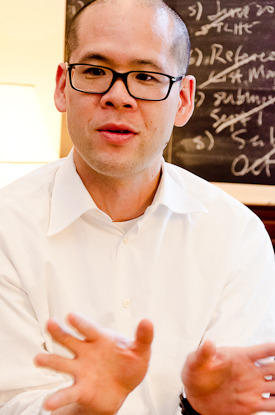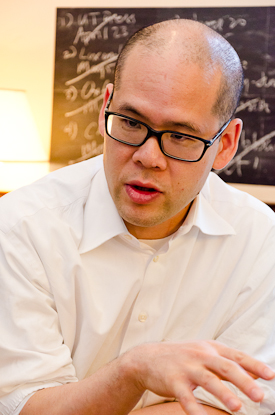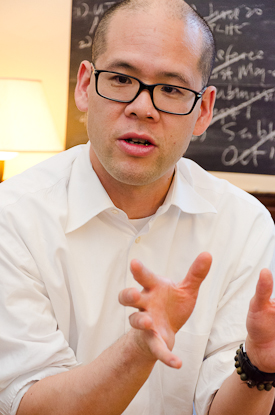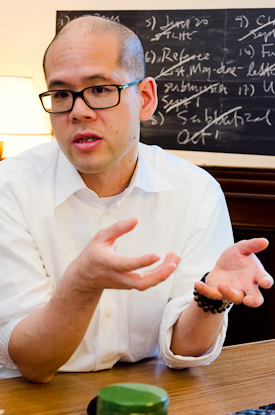|
The Boundary-Blurring Research of Professor Hoi Kong
As a researcher, Assistant Professor Hoi Kong is interested in many things—constitutional Republicanism, Canadian federalism, sustainable development—but above all else, he cares about good design: of pens and eyeglasses, of lighting and classrooms, and of governmental bodies and housing developments.
Hoi Kong (BCL’02, LLB’02) is a magnet for interdisciplinary projects at the intersection of law and urban design: he recently began a three-year, SSHRC-funded collaboration with colleagues from the McGill School of Architecture and School of Urban Planning.
Defying easy categorization, Kong’s boundary-blurring work combines constitutional, environmental and ethical concerns. In an in-depth interview done late last year, Focus Online asked him to sketch it out for us.
You recently published an article in the Vermont Journal of Environmental Law on “Sustainability and Land Use Regulation in Canada: An Instrument Choice Perspective,” and you have a piece forthcoming from the Missouri Law Review on “The Disaggregated State in Transnational Environmental Regulation.” What is your main interest in environmental law?
My main areas of research right now are federalism, municipal law and land-use law. Basically, cities and federations. And environmental law is a central concern of these areas of law. What I find fascinating is: how can we design institutions and laws, in ways that respond to environmental and sustainable development concerns?
Those two papers look at examples of the relationship between the design of legal institutions and environmental regulation. The paper in the Vermont Journal looks at ways to develop land, while reducing sprawl and pollution, and the forthcoming article is about sub-federal entities—states and provinces—coming together to create institutions through which they can regulate environmental issues.
You have spoken several times this year on affordable housing and urban design, and published a piece in the MLJ called “Toward a Federal Legal Theory of the City.” Last year, you were the principal investigator for “Spatiality and Justice: Interdisciplinary Investigations on the Political Philosophy of the City,” a conference for which you received a SSHRC grant. What is your interest in “the City”?
The workshop brought together people from a lot of different disciplines—urban planners, political theorists, political scientists, law professors—to discuss theoretical questions around ‘The City.’ My particular contribution to that workshop, and the publication that came out of it, was about how to design municipal regulations in ways that could respond to the problems of social exclusion and inequality.
At the conference, we talked about “the city” in the abstract. But when I write on cities, I tend to select case studies and specific legal institutions, to see what lessons that can be learned from what’s happening on the ground. For example, the focus of the MLJ article was a set of municipal arrangements in British Columbia. I looked at how “regional districts” can provide an institutional forum for cooperation and coordination among municipalities that would otherwise be isolated from one another.
For the next three years, you will be the Principal Investigator of an Insight Grant from SSHRC, entitled “From Speculation to Evaluation: A Digitally-Mediated Laboratory for Local Deliberative Democracy,” with co-investigators Nik Luka, a Professor at both the McGill School of Architecture and the School of Urban Planning, and Law Professor Daniel Weinstock. What is this all about?
This is a project we’re hoping will have some real direct impacts on the ground in Montreal. One of the concerns we have with land use law is that certain people get excluded from the planning process. People are typically invited to participate, but there are real concerns about the quality of the participation, and who actually comes to participate. So, we’re going to be collaborating with a local community organization, le Comité logement de la Petite-Patrie, in an interesting neighbourhood with a lot of social and economic diversity.
We’re designing forums to which people can have easy access—some online, some in-person—that would allow them to contribute to land-use development projects. We want to give people a chance to meaningfully participate in the decisions that affect them. We’re designing the consultation process, and we plan to begin the consultations later this year. We’re hoping that at the end of this project, we can propose legal reforms that will reflect these redesigned processes. And we think that the project will enable us to say interesting things about theories of deliberative democracy and citizen engagement in local governance.
You recently published a piece in the Review of Constitutional Studies called “Towards a Civic Republican Theory of Canadian Constitutional Law,” and you have a paper forthcoming from the University of Toronto Law Journal, entitled “Republicanism and the Division of Powers in Canada.” Are you a Civic Republican? What does that term mean to you?
I’m using the term in a very specific way—Republicanism is a strand in contemporary political theory that has a real presence in the United States, but not so much in Canada. Republicanism is one way in which I’ve thought about the division of powers in Canada. I’m also exploring this idea in relation to Canadian constitutional law, specifically in the jurisprudence around the Canadian Charter of Rights and Freedoms and the rule of law. I think the research has revealed important things, with interesting implications.
In the federalism context, the idea—in a nutshell—is that the relationship between the orders of government in Canada should be structured in a way that doesn’t subject one order of government to the unconstrained, arbitrary will of another order. My overall aim is to structure constitutional doctrine in ways that prevent relationships of domination from arising.
What’s next for you?
One project I’m working on, through the Hydro Quebec funding, is a collection of papers with Cambridge University Press on how the sustainable development measures in the North American Free Trade Agreement have been implemented by the members of NAFTA. I’ll be putting together a workshop in June where the papers will be presented. I’m working on this with colleagues from Vermont Law School, and the workshop will be hosted by the Commission on Environmental Cooperation.
I’m also working with colleagues from Université de Montréal (Han-Ru Zhou) and Université de Sherbrooke (Maxime St-Hilaire) on the second edition of the constitutional working paper series, which this year is dedicated to the constitutional jurisprudence of Justice Marie Deschamps. My colleagues and I aim to have this year’s papers published by year’s end in a special edition of a journal that we will co-edit.
After that, I think the next big project will probably be to bring my institutional design work, which I have been doing at the land-use level, to another context—administrative agencies, for instance. I am exploring the idea now. It would bring together a lot of the threads I’ve been working on.
And I’ll keep writing in constitutional law. There’s probably one more article that I’m going to write about republicanism—I’ve written on republicanism and the rule of law and individual rights, and on republicanism and federalism. Probably the next paper will be about group rights. I’m also committed to writing an article on the idea of proportionality in constitutional law in the next little while.
So that’s what I see on the horizon for the next few months… Beyond that, we’ll see what happens…
Interview by Bridget Wayland.
Photos by Lysanne Larose.



 « One of the concerns we have with land use law is that certain people get excluded from the planning process. People are typically invited to participate, but there are real concerns about the quality of the participation, and who actually comes to participate. »
« One of the concerns we have with land use law is that certain people get excluded from the planning process. People are typically invited to participate, but there are real concerns about the quality of the participation, and who actually comes to participate. »